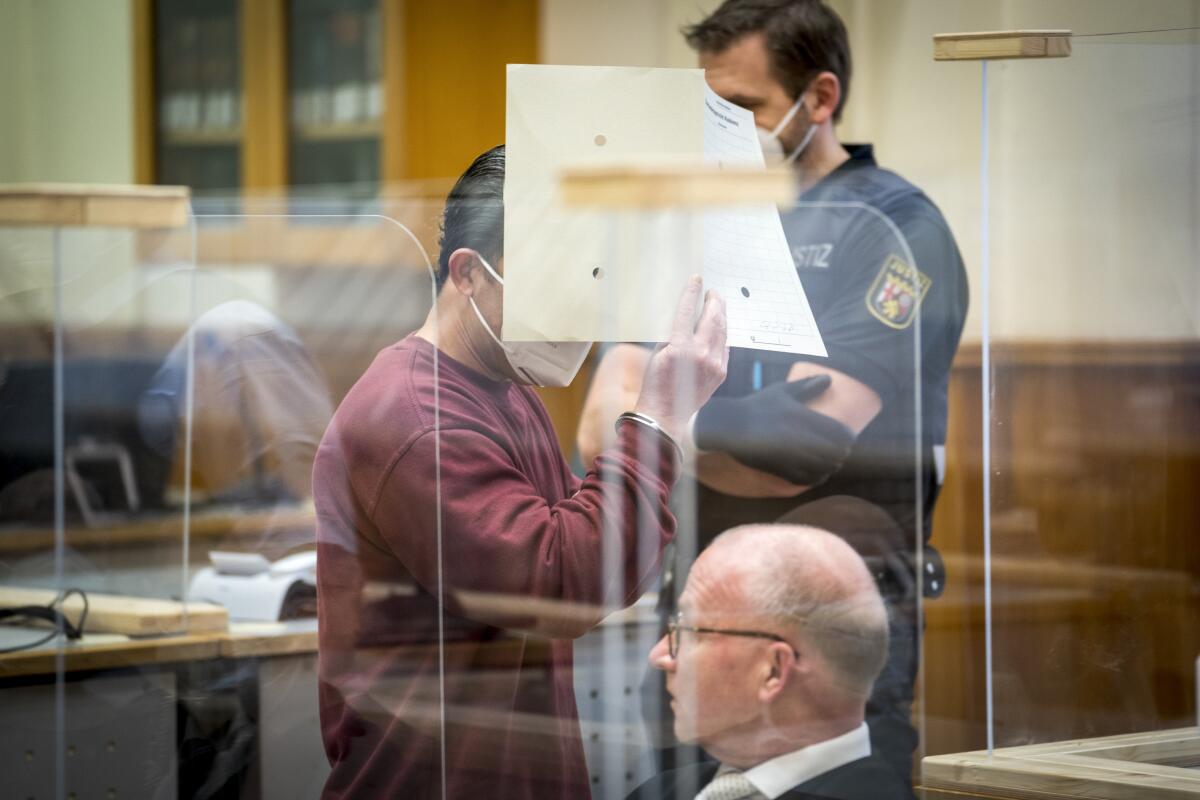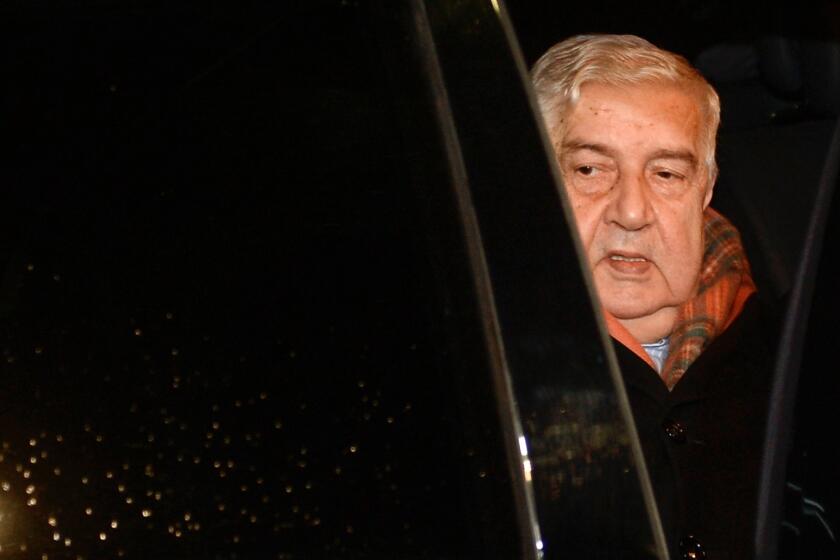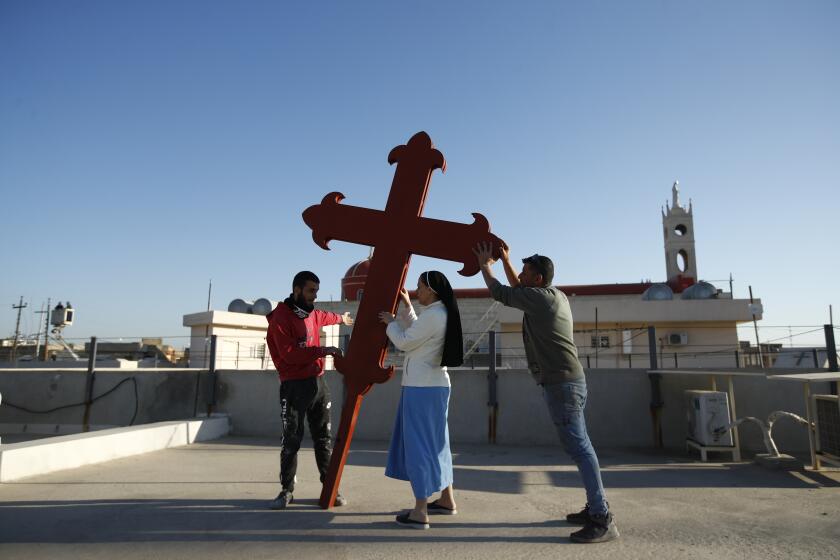Conviction of former Syrian secret police officer brings solace — but sparks a debate

DUBAI, United Arab Emirates — In the winter of 2014, Anwar Bunni, a top human rights lawyer who escaped to Germany from his native Syria, was in a refugee camp near Berlin when he saw a familiar face.
“I couldn’t remember him exactly. He saw me and turned away,” Bunni said.
It was only days later that Bunni placed him: It was Anwar Raslan, a colonel in Syria’s intelligence services. Almost a decade earlier, Raslan had nabbed Bunni from the streets of Damascus, shoving him into a car and taking him to a branch of Syria’s General Intelligence Directorate for what turned out to be a five-year prison stay.
The chance meeting in the refugee camp started a chain of events that led a German court Wednesday to convict one of Raslan’s subordinates, Eyad Gharib, of aiding and abetting torture and imprisonment as a crime against humanity. Raslan remains on trial — a verdict is expected this year — but Bunni and human rights groups involved in the case hailed Wednesday’s ruling as the end of impunity in Syria’s almost decade-long civil war.
“It’s a historic day for Syria and the world,” Bunni said. “For the first time, someone is convicted for belonging to the regime’s killing machine.”
Yet the case has sparked a wider debate, with some seeing the verdict against Gharib as less a victory for justice than a story of war’s moral exigencies — the difficult choices and often-dubious paths that some combatants take to survive. Indeed, some critics say Gharib’s conviction could actually end up having the opposite effect of making further trials of accused Syrian war criminals less likely.
The Trump administration accused Syria’s government on Monday of hanging hundreds of political opponents and other prisoners and burning their bodies at a military prison near Damascus, part of what the State Department called an egregious pattern of atrocities by Syrian President Bashar Assad.
Gharib, 44, was sentenced by the Higher Regional Court in the German city of Koblenz to 4½ years in prison. His trial, along with Raslan’s, began in April 2020, with both of them prosecuted under the principle of universal jurisdiction for serious crimes no matter where they allegedly occurred. With Syrian President Bashar Assad still in power and little hope of accountability within the country, that principle has granted victims of Syria’s security forces — many of them refugees now living overseas — the ability to pursue alleged perpetrators of war crimes or genocide in European and other international courts.
During the trial, which took place over 61 days, 54 witnesses and experts detailed a systematic campaign of torture within the walls of Branch 251, a notorious detention center, and Division 40, one of its subsections.
One witness, a 38-year-old woman, described soldiers’ constant beatings with whips, cables and electric prods in cockroach-infested hallways as the songs of Fairouz, a famous Lebanese singer, provided a soundtrack to the shouts and pleas of detainees. Women were threatened with rape and denounced as prostitutes, she said.
Patrick Kroker, a lawyer who represented a number of co-plaintiffs in the trial, called the verdict against Gharib “the first time a court has confirmed that the acts of the Syrian government and its collaborators are crimes against humanity.” The Biden administration tweeted that the trial’s outcome advanced “accountability for Assad’s atrocities, including the well-documented torture of over 14,000 Syrians.”
One former prisoner described undergoing desperate jailhouse surgery performed with a scavenged razor blade.
Yet Gharib, critics say, represented a particularly low-level prize. According to testimony he provided to German prosecutors investigating Raslan, Gharib first joined the Syrian intelligence service in the 1990s as a sports instructor. By the time the uprisings against Assad’s rule began in 2011, he had risen only to the rank of sergeant.
And as a Sunni Muslim who hailed from Syria’s eastern regions, he said in a letter read out in court, he had been viewed with suspicion within the intelligence services, which are dominated by Alawites, the minority religious sect that includes the Assad family.
Sometime around September 2011, Gharib told investigators, he was deployed in an operation to break up a demonstration. Other soldiers shot at protesters with assault rifles, but he did not take part, he said, calling it instead the moment when he decided he would defect to the opposition. The shooting over, he pursued and caught 30 survivors. They were taken to Branch 251, where Raslan headed the investigations unit and where Gharib knew detainees were subject to mistreatment, torture or death.
In early 2012, Gharib defected and returned to his village in the eastern province of Dair Alzour. There he joined the opposition and fought against government troops before being expelled by Islamic State, the extremist group that took over eastern Syria in 2013. It took him five years to reach Germany, where he applied for asylum after making the dangerous sea voyage from Turkey to reach Europe.
Photos may provide evidence of torture, killing of Syria detainees
In their argument for his acquittal, Gharib’s lawyers noted that his testimony was given in his capacity as a witness to build the case against Raslan, not to incriminate himself. Only later did Gharib become a suspect, forcing police to release him and then arrest him so that his testimony could be admissible.
No witnesses identified Gharib in the Branch 251 detention center, meaning that most of the evidence against him had unwittingly come from his own asylum application.
By contrast, Raslan is charged with the torture of some 4,000 people, the killings of 58 and at least one rape. Prosecutors had called on Syrian rights groups and figures like Bunni to seek out and identify victims willing to testify against Raslan; dozens came forward.
Raslan had also joined the rebels in 2012, for reasons that remain unclear. He used his status as a high-ranking security official to become a military advisor to the opposition delegation in Syrian peace talks in 2014. Those connections also got him a visa allowing him to travel from Jordan to Germany, where he received asylum before being arrested — based partially on Gharib’s testimony — in 2018.
Breaking News
Get breaking news, investigations, analysis and more signature journalism from the Los Angeles Times in your inbox.
You may occasionally receive promotional content from the Los Angeles Times.
Whereas Gharib has shown genuine remorse, Raslan has consistently denied any torture under his watch even as he continued to defend the government’s actions, said Mohammad Al Abdallah, director of the Washington-based Syria Justice and Accountability Center and a onetime prisoner in Syria with Bunni.
“Raslan was a colonel. Eyad was a soldier. If he refused, he would have been killed or sent to Sednaya prison,” Al Abdallah said, referring to a notorious lockup outside Damascus that rights groups say was a charnel house where tens of thousands of demonstrators were killed.
And though Gharib’s conviction may offer a measure of solace to the families of those killed by the Syrian government, Al Abdallah said, his trial has already frightened other insider witnesses from giving evidence against the government, for fear their words may end up being used against them.
“We had one witness in a military hospital who wanted guarantees he would not be prosecuted, and we can’t do that now,” Al Abdallah said.
Terrorized by Islamic State, Iraq’s dwindling Christians hope a historic visit by Pope Francis starting next week will boost their chances to survive.
He also doubts that Gharib’s trial will serve as a deterrent to current members of Syria’s security services, noting that torture has continued.
Meanwhile, those who ordered the torture would never set foot in Europe or any other jurisdiction where they might face prosecution. Senior members of Assad’s government and security forces are subject to a bevy of European and U.S. sanctions, including a visa ban that makes travel to any country where an arrest warrant could be issued well-nigh impossible.
None of that matters to Bunni, who counts the verdict and sentence against Gharib as an unqualified victory with important consequences.
“I don’t care about catching these people,” he said. “This sentence cut off the road to their political rehabilitation. There’s no way they can be a part of a future political solution for the country.”
More to Read
Sign up for Essential California
The most important California stories and recommendations in your inbox every morning.
You may occasionally receive promotional content from the Los Angeles Times.












